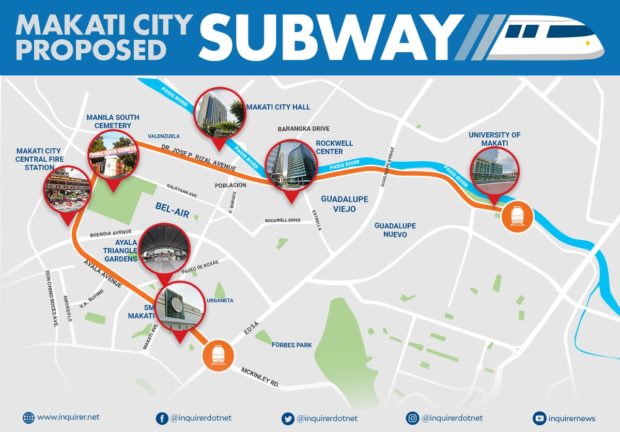MANILA, Phillippines — Makati Subway Inc. — the builder of the city’s proposed 11-kilometer underground train system — has started buying and paying P1 million in “early bird” incentives to residents whose properties will be affected when the country’s first underground train system starts construction.
In a statement, City Administrator Claro Certeza said the first batch of 55 lot owners accepted the purchase offer of the private consortium that would construct the Makati Subway or MkTr.
The initial 55 lots have a combined value of P1.18 billion and cover a total area of 7,683.83 square meters, said Certeza, who also chairs the city’s PPP (public-private partnership) selection committee.
“The landowners who promptly accepted the offer will each get a P1 million incentive from Makati Subway Inc.,” he said.
Of the 55 lot owners, five submitted all the required documents and were paid a total of P62.9 million by Makati Subway Inc. Owners of the remaining 49 lots are currently processing their documents for the transfer, according to Certeza.
‘On track’ despite crisis
“Despite the crisis, Makati Subway is on track,” he said.
“Our private sector partner has been communicating and negotiating with concerned property owners for the acquisition of lands needed for the project.”
Certeza expressed hope other property owners would soon follow so the project’s initial phase can be completed and the private partner can proceed with construction.
The project aims to reduce vehicular traffic within the central business district when it comes online in 2025.
In July last year, Mayor Abby Binay led the signing of the subway project joint-venture agreement between Makati City and Antonio Tiu’s Philippine Infradev Holdings Inc.
Philippine Infradev Holdings has partnered with Chinese firms to finance the subway project.
Estimated project cost
From the earlier estimate of $3.7 billion, the project cost went down to $2.5 billion, due to the favorable results of the final soil test and cost savings from the tweaking of the subway alignment, according to an Inquirer report in October last year.
The subway system will connect key points, such as the central business district on Ayala Avenue, Makati City Hall, Poblacion heritage site, the University of Makati, Ospital ng Makati and new business districts in the city.
Up to 700K passengers daily
Its J-shaped 10-kilometer route will begin under the present site of the Makati Central Fire Station near the intersection of Ayala and Gil Puyat Avenues and will end at the University of Makati at the border of Bonifacio Global City in Taguig.
The project can ferry up to 700,000 passengers daily with its six-car trains.
Under Ordinance No. 2019-A-020, the local government would not spend a single centavo for the project and would instead allow the land it owns to be used for the subway system.
Tiu, the majority owner of Infradev, said last year that the city government’s revenue share of close to 25 percent would be commensurate with the valuation of land to be contributed to the venture.
“The subway project comes at an opportune time when we’re trying to rebuild our economy and to secure employment for thousands of Filipinos displaced by the pandemic,” Certeza said in the statement.
Some 10,000 jobs are projected during subway construction and operation. City residents, including senior citizens who are still fit to work, will be given priority for employment.
